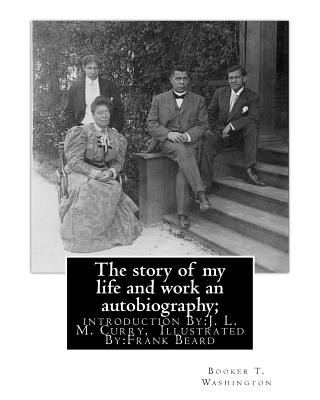
- We will send in 10–14 business days.
- Author: J L M Curry
- Publisher: CreateSpace Independent Publishing Platform
- Year: 2016
- Pages: 190
- ISBN-10: 1539928160
- ISBN-13: 9781539928164
- Format: 20.3 x 25.4 x 1 cm, minkšti viršeliai
- Language: English
- SAVE -10% with code: EXTRA
Reviews
Description
Booker Taliaferro Washington (April 5, 1856 - November 14, 1915) was an American educator, author, orator, and advisor to presidents of the United States. Between 1890 and 1915, Washington was the dominant leader in the African-American community. Washington was from the last generation of black American leaders born into slavery and became the leading voice of the former slaves and their descendants. They were newly oppressed in the South by disenfranchisement and the Jim Crow discriminatory laws enacted in the post-Reconstruction Southern states in the late 19th and early 20th centuries. His base was the Tuskegee Institute, a historically black college in Alabama. As lynchings in the South reached a peak in 1895, Washington gave a speech, known as the "Atlanta compromise," which brought him national fame. He called for black progress through education and entrepreneurship, rather than trying to challenge directly the Jim Crow segregation and the disenfranchisement of black voters in the South. Washington mobilized a nationwide coalition of middle-class blacks, church leaders, and white philanthropists and politicians, with a long-term goal of building the community's economic strength and pride by a focus on self-help and schooling. But, secretly, he also supported court challenges to segregation and passed on funds raised for this purpose.[1] Black militants in the North, led by W. E. B. Du Bois, at first supported the Atlanta compromise but after 1909, they set up the NAACP to work for political change. They tried with limited success to challenge Washington's political machine for leadership in the black community but also built wider networks among white allies in the North.[2] Decades after Washington's death in 1915, the Civil Rights movement of the 1950s took a more active and militant approach, which was also based on new grassroots organizations based in the South, such as CORE, SNCC and SCLC. Jabez Lamar Monroe Curry, also known as J. L. M. Curry, (June 5, 1825 - February 12, 1903) was a lawyer, soldier, U.S. Congressman, college professor and administrator, diplomat, and officer in the Confederate States Army during the American Civil War. Frank Beard, United States (1842-1905), was illustrator, caricaturist and cartoonist. He was the principal illustrator for The Ram's Horn, an interdenominational social gospel magazine. The Ram's Horn was published in Chicago, Illinois during the 1890s and the early years of the twentieth century by Frederick L. Chapman & Company.Beard had an active career as an illustrator. His cartoons appeared in Judge, and he illustrated books. In his work, Beard also used sequential art, such as in 'Puck on the Road' from 1889.
- Author: J L M Curry
- Publisher: CreateSpace Independent Publishing Platform
- Year: 2016
- Pages: 190
- ISBN-10: 1539928160
- ISBN-13: 9781539928164
- Format: 20.3 x 25.4 x 1 cm, minkšti viršeliai
- Language: English English
Booker Taliaferro Washington (April 5, 1856 - November 14, 1915) was an American educator, author, orator, and advisor to presidents of the United States. Between 1890 and 1915, Washington was the dominant leader in the African-American community. Washington was from the last generation of black American leaders born into slavery and became the leading voice of the former slaves and their descendants. They were newly oppressed in the South by disenfranchisement and the Jim Crow discriminatory laws enacted in the post-Reconstruction Southern states in the late 19th and early 20th centuries. His base was the Tuskegee Institute, a historically black college in Alabama. As lynchings in the South reached a peak in 1895, Washington gave a speech, known as the "Atlanta compromise," which brought him national fame. He called for black progress through education and entrepreneurship, rather than trying to challenge directly the Jim Crow segregation and the disenfranchisement of black voters in the South. Washington mobilized a nationwide coalition of middle-class blacks, church leaders, and white philanthropists and politicians, with a long-term goal of building the community's economic strength and pride by a focus on self-help and schooling. But, secretly, he also supported court challenges to segregation and passed on funds raised for this purpose.[1] Black militants in the North, led by W. E. B. Du Bois, at first supported the Atlanta compromise but after 1909, they set up the NAACP to work for political change. They tried with limited success to challenge Washington's political machine for leadership in the black community but also built wider networks among white allies in the North.[2] Decades after Washington's death in 1915, the Civil Rights movement of the 1950s took a more active and militant approach, which was also based on new grassroots organizations based in the South, such as CORE, SNCC and SCLC. Jabez Lamar Monroe Curry, also known as J. L. M. Curry, (June 5, 1825 - February 12, 1903) was a lawyer, soldier, U.S. Congressman, college professor and administrator, diplomat, and officer in the Confederate States Army during the American Civil War. Frank Beard, United States (1842-1905), was illustrator, caricaturist and cartoonist. He was the principal illustrator for The Ram's Horn, an interdenominational social gospel magazine. The Ram's Horn was published in Chicago, Illinois during the 1890s and the early years of the twentieth century by Frederick L. Chapman & Company.Beard had an active career as an illustrator. His cartoons appeared in Judge, and he illustrated books. In his work, Beard also used sequential art, such as in 'Puck on the Road' from 1889.


Reviews